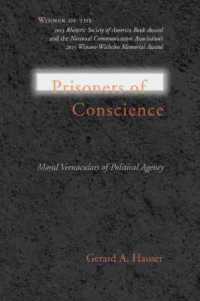- ホーム
- > 洋書
- > 英文書
- > Literary Criticism
Full Description
Obscene poetry, servants' slanders against their masters, the diabolical acts of those who committed massacre and regicide. This is a book about the harmful, outward manifestation of inner malice--villainy--in French culture (1463-1610). In pre-modern France, villainous offences were countered, if never fully contained, by intersecting legal and literary responses. Combining the methods of legal anthropology with literary and historical analysis, this study examines villainy across juridical documents, criminal records, and literary texts. Whilst few people obtained justice through the law, many pursued out-of-court settlements of one kind or another. Literary texts commemorated villainies both fictitious and historical; literature sometimes instantiated the process of redress, and enabled the transmission of conflicts from one context to another. Villainy in France follows this overflowing current of pre-modern French culture, examining its impact within France and across the English Channel.
Scholars and cultural critics of the Anglophone world have long been fascinated by villainy and villains. This book reveals the subject's significant 'Frenchness' and establishes a transcultural approach to it in law and literature. In this study, villainy's particular significance emerges through its representation in authors remembered for their less-than respectable, even criminal, activities: François Villon, Clément Marot, François Rabelais, Pierre de L'Estoile, Christopher Marlowe, Ben Jonson, John Marston, and George Chapman. Villainy in France affords legal-literary comparison of these authors alongside many of their lesser-known contemporaries; in so doing, it reinterprets French conflicts within a wider European context, from the mid-fifteenth century to the early seventeenth century.
Contents
Introduction: Going with Villainy's Flow
Part I. Villainy: What the Jurists Say
1: Criminalizing Villainy
2: The Villain: Morality and Status
3: The Villainies of a Facetious Jurist
Part II. A Poetry of Villains
4: Villains and Villons
5: François Villon: Attesting Villainies
6: Defence, Attack, Arbitration
Part III. Remembering Rabelais: Tricksters and Trials
7: Profanity and Polemic
8: Panurge: The Making of a Villain
9: Taking on the Law
10: Old Panurgos and Beaten Foxes
Part IV. Massacre and Villainy
11: Responding to the St Bartholomew's Day Massacre
12: A French History of 'Most Shamefull Villanie'
13: Forensic Tragedy: The Case against 'Vilain Herodes'
14: The Drama of Regicide
Part V. L'Estoile: Villainy between Law and Literature
15: Disavowing Villainy
16: Enduring the Catholic League
17: Family Crimes
18: Transcultural Debasement
Afterword: Still going with Villainy's Flow








